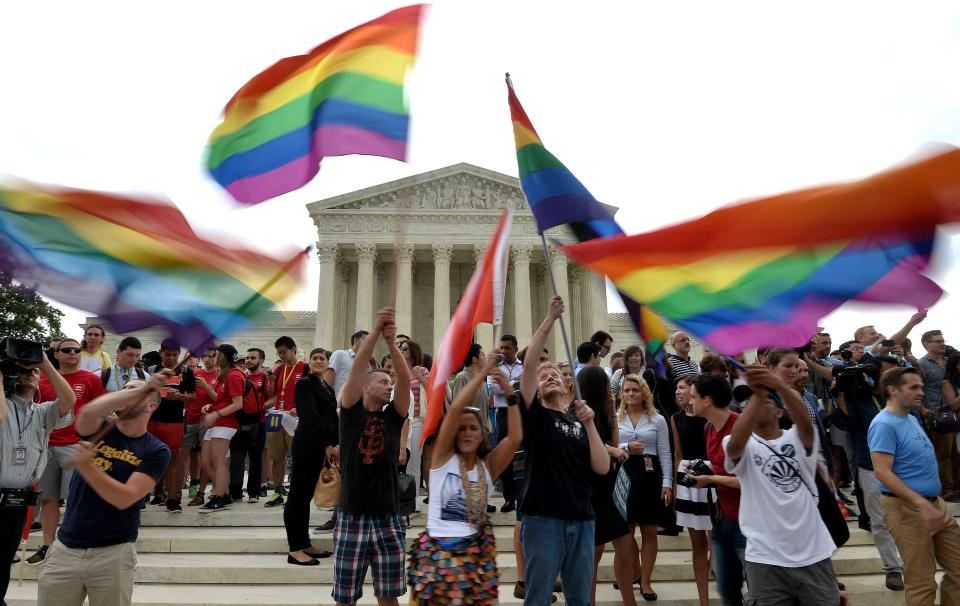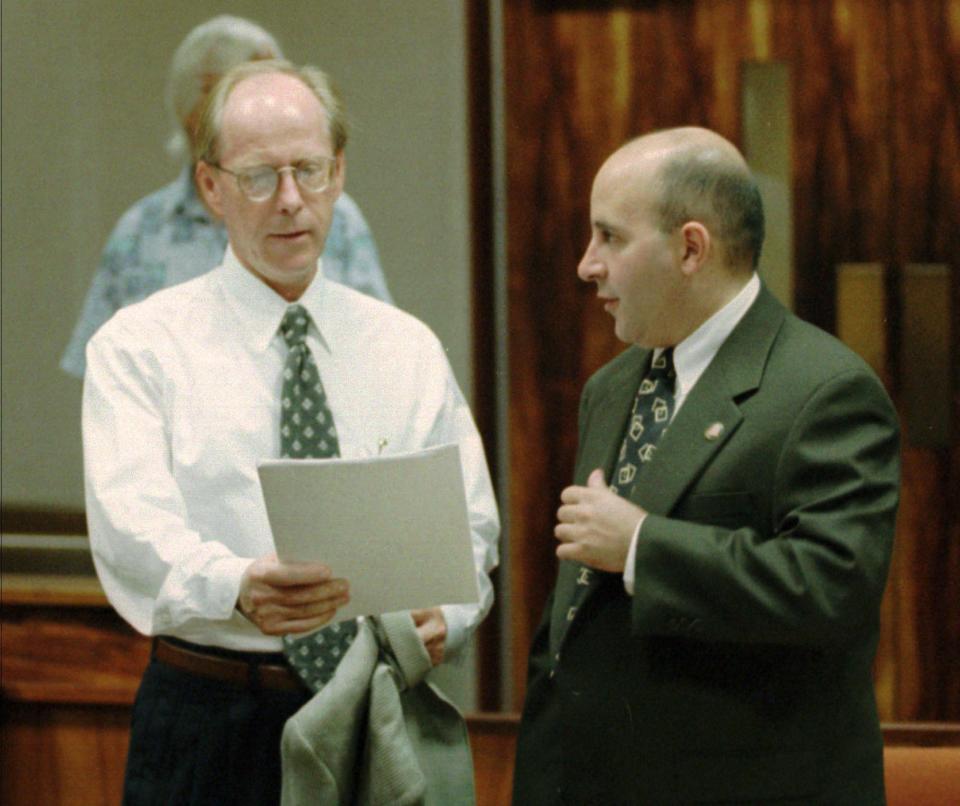Respect for Marriage Act is a triumph for families, freedom – and American activism
- Oops!Something went wrong.Please try again later.
It has been powerful over the past few weeks hearing the stories of same-sex couples and their families as Congress debated the Respect for Marriage Act.
And it will be even more powerful when the measure is signed into law, sending the clear message that those who threaten Americans’ rights are way out of step with a bipartisan supermajority of the American people.
Republican Sen. Rob Portman of Ohio has spoken movingly about his son, who is gay. During the debate, the Democratic lead sponsor, Sen. Tammy Baldwin of Wisconsin, brought a large portrait of her friends’ family onto the floor. And Senate Majority Leader Chuck Schumer’s phone call after passage was to his daughter, who is expecting a child with her wife next spring.
Respect for Marriage shows how far we've come
Countless other families have shared their personal stories in conversations about the bill. Such stories and conversations represent the foundation of the decades-long campaign to secure the freedom to marry for same-sex couples. And as founder of the Freedom to Marry campaign, I see the bipartisan passage of the Respect for Marriage Act – the first version of which I helped draft over a decade ago despite little prospect of it passing – as a welcome affirmation of the broadening support for LGBTQ equality nationwide.
Threat from Supreme Court: We told our wedding guests about gay marriage inequality. We thought it was in the past.

The success of the freedom to marry campaign marked a triumph for American freedom and an inspiring barometer for how far the nation has opened its hearts and minds to LGBTQ people. In 1988, just 11% of the country "agreed with gay marriage"; now support is at a record 71%, including a majority of Republicans.
One-time opponents such as the Church of Jesus Christ of Latter-day Saints and Seventh Day Adventists say they appreciate the compromises in this bill to respect religious freedom.
The Respect for Marriage Act is also an illustration of effective bipartisanship and good government. I am grateful for the tenacity of Sen. Baldwin, whom I first met long ago when she was one of the first state legislators in the country willing to champion the freedom to marry.
Sens. Baldwin, Schumer and Portman, House Speaker Nancy Pelosi and President Joe Biden, alongside Sens. Susan Collins of Maine, Kyrsten Sinema of Arizona and Thom Tillis of North Carolina, have now secured an undeniable bipartisan victory, mirroring a bipartisan House vote Thursday to pass the Respect for Marriage Act.
My dear friends: I thought I ruined an LGBTQ wedding anniversary but instead was reminded that 'love is love'
Republican voters want marriage equality: Our country is at a turning point
This law will provide relief to millions of families who have been alarmed by a runaway Supreme Court’s willingness to roll back rights, exemplified by the shocking decision overturning Roe v. Wade and Justice Clarence Thomas’ call on the court to revisit other landmark precedents, including on marriage and contraception.
Now, no matter what happens at the Supreme Court, the federal government and every state will continue to legally respect married same-sex couples and accord their marriages equal treatment.
For better and for worse
Some critics have expressed concern that the legislation does not itself require states to issue marriage licenses to same-sex couples. Others have voiced complaints about its religious exemptions.
On the first point, there is a real question about whether Congress is constitutionally empowered to mandate marriage laws, generally the province of the states. But the Respect for Marriage Act will provide a backstop ensuring that all couples will have their marriages respected throughout the country.
For better and for worse, its narrow religious exemptions reflect current jurisprudence. Present-day nondiscrimination and religious exemption laws are indeed far from perfect, but this legislation does not change that reality in either direction. It does include a provision that exempts houses of worship and religious nonprofits from being required to celebrate, provide services for or officiate at marriages.
'Not left or right, but deep': How people of faith can help to heal America's divisions
Supreme Court case: Can the government force us to say things we don’t believe?
While I’d prefer an even more tailored exclusion, it is in keeping with trends in the law, as well as agreements negotiated in many state capitals, and has the virtue of underscoring the distinction between civil and religious marriage.
Critically, the exemption language does not go any further, nor does it override other legal protections that other laws provide. And despite intense lobbying by hostile, theocratic anti-LGBTQ groups for sweeping carve-outs, the measure does not grant any new “license to discriminate” to just anybody who doesn’t want to follow the law.

Where our fight continues
Of course, advocates are right to keep up the fight against anti-LGBTQ discrimination. LGBTQ people remain vulnerable in key areas of life, and the myriad legislative assaults on gay and transgender Americans are cruel, harmful and out of step with the views of the American people.
Legislation such as the Equality Act, now stalled in the Senate, remains essential, and we must keep working – and voting – at every level of government.
Opinion alerts: Get columns from your favorite columnists + expert analysis on top issues, delivered straight to your device through the USA TODAY app. Don't have the app? Download it for free from your app store.
A central lesson from the marriage fight is that while persuasion is an essential element, it alone is not enough. We need continued political engagement and activism to ensure that our country’s politics and the law reflect where the majority of American people are – on the freedom to marry, transgender inclusion, reproductive freedom, voting rights and workers’ rights, and more.
The American people’s transformation on the freedom to marry provides an inspiring road map for moving forward on the many protections that advocates are still fighting for.
Details and nuances notwithstanding, the message on this legislation affirming the freedom to marry and standing up for LGBTQ people is already being heard around the world. We can be proud of the Respect for Marriage Act – and should harness its momentum to continue pushing forward.
Evan Wolfson founded and led the Freedom to Marry campaign and now shares lessons on how to win with other causes and organizations domestically and around the world.
You can read diverse opinions from our Board of Contributors and other writers on the Opinion front page, on Twitter @usatodayopinion and in our daily Opinion newsletter. To respond to a column, submit a comment to letters@usatoday.com.
This article originally appeared on USA TODAY: Respect for Marriage Act House vote shows progress in LGBTQ support

